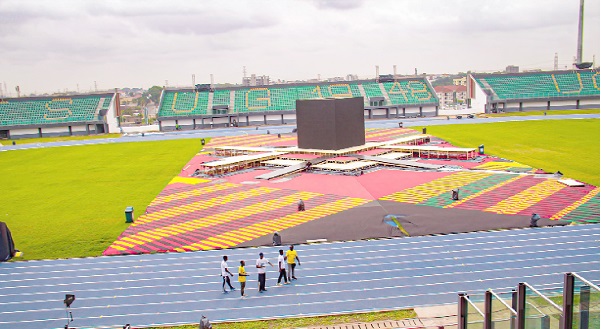
13th African Games: Game changer or financial drain?
In the next two weeks Ghana's capital city of Accra will be positioned at the forefront of the sporting world as it hosts the 13th African Games, the continent's biggest sporting extravaganza featuring top-tier athletes competing for glory in 29 different disciplines.
Advertisement
With an impressive lineup of over 13,000 participants, comprising 5,000 athletes, 3,000 technical officials, 3,000 volunteers and 2,000 guests from 55 African countries, the March 8 - 24 event demands huge investments for host countries like Ghana to shoulder the full burden of staging a competition that hardly yields the promised economic benefits. Instead, it delivers on aspirations of leaving a lasting legacy, igniting national pride, fostering cultural exchange, and potentially boosting the domestic sports industry.
Promised benefits
However, as the sporting extravaganza unfolds in Accra and Cape Coast (host venue of the female football competition), there are looming questions surrounding the prudence in investment of over $240 million in an event that seems to lack clear economic viability. With the country grappling with economic challenges, emerging details about the hefty expenditure on the games continue to raise eyebrows and spark debate among Ghanaians and economic observers alike.
Amidst the euphoria surrounding the games, the revelation this week by the Minister of Youth and Sports, Mustapha Ussif, that the government had spent $195 million on infrastructure and an operational budget of $47.7 million caused a lot of stir. In July 2022, Ghana's Parliament approved a $750m Afreximbank loan facility of which the government used $170m to fund the African Games preparation.
It took five years of meticulous preparation, having built facilities at Borteyman, the University of Ghana and renovated existing infrastructure for the different sporting disciplines for the three-week festival, as Ghana again demonstrate its prowess in organising and hosting a world-class sporting extravaganza.
Organised on the theme: "Experience the African Dream," Accra has become Africa's sporting capital, a bustling hub of sporting activity as the continent's elite athletes push the limits of their abilities to compete for glory and a piece of sporting history. It also provided Ghana with an opportunity to showcase the country's diverse culture to the rest of the world during yesterday's opening ceremony at the University of Ghana Stadium.
From a sporting perspective, the 13th African Games holds immense significce for Ghana to strategically transform the country's sporting landscape for years to come. It has provided an impetus for the government of Ghana to commit $195 million to the construction of the Borteyman Sports Complex, a first-class facility which boasts an aquatic centre with a 10-lane swimming pool, two indoor sports halls, and a tennis court, among others. It will be at the heart of the action as it hosts more than 10 sporting disciplines during the games.
In addition, the completion of the University of Ghana Stadium, which is the venue for track and field competitions, a new rugby field at Legon, renovation of the Achimota Cricket Oval and other selected venues, have greatly boosted the country's sporting infrastructure and revived many sporting disciplines which hitherto attracted little attention and support from the state and corporate organisations.
Opportunities for athletes
Hosting the African Games has provided opportunities for talents from a wide field with Ghana sending a contingent of over 500 athletes to compete in disciplines, including Arm wrestling, Athletics, Badminton, Basketball (3x3), Beach volleyball, Boxing, Cricket, Cycling, Diving, Field Hockey, Football, Handball, Judo, Karate-do, Netball, Rugby sevens, Squash, Swimming, Table tennis, Taekwondo, Tennis, Volleyball, Weightlifting, Wrestling, and demonstration sports such as E-sports, Mixed Martial Arts, Pickleball, Teqball, Scrabble and Speed-ball.
For Ghanaian athletes and those from other competing nations, the significance of these games extends far beyond mere competition. With seven designated Olympic qualifying events, athletes will have the opportunity to secure their slots at the Paris 2024 Olympic Games, adding an extra layer of intensity beyond the quest for medals.
Ghana may not rank among the continent's top performers in the history of the African Games, with traditional heavyweights such as Nigeria, Kenya, South Africa, Egypt and Algeria expected to dominate this time. However, as hosts, there will be pressure on Ghanaian athletes to excel and compete favourably for a share of the medal haul, especially in disciplines such as
football, boxing, wrestling, arm-wrestling, hockey and athletics where stars such as Benjamin Azamati and Joseph Paul Amoah have high potential to win medals.
Amid criticism about the huge expenditure on the games, including claims by the Member of Parliament for the North Tongu Constituency, Samuel Okudzeto Ablakwa, that the government was spending over and above the amount approved by Parliament as the operational budget, the Sports Minister explained that the $47.7 million covered a spectrum of activities necessary for the successful organisation of the African Games and was not restricted to expenditure during the three-week competition.
"The estimated amount of $47,712,853.65 is designated to cover the operations of the LOC. These operations include technical meetings with TCAG, preparation of relevant guidelines, rules, regulations and manuals, sensitisation efforts, payment games management system, accommodation for participants (including athletes, volunteers and officials), internal transportation, airfare for officials, catering services, security, allowances, accreditation, medical equipment, athlete medals, office rent, logistics, equipment purchase, anti-doping services, and allowances for members," Mr Ussif said at a press conference last Monday.
Unlike the highly profitable FIFA World Cup and the Olympic Games which generate huge revenues through corporate sponsorships and TV rights, as well as strong inflows of tourists, the growing cost of hosting multi-sport events such as the African Games, and to some extent the Commonwealth Games, is becoming less attractive for economically-strained nations without adequate sporting infrastructure.
When the curtains are drawn on the 13th African Games, reflections on its socio-economic impact will fuel discussions on the wisdom of staging such grand events amidst the country's financial constraints.




